عرب ممالک کے عالمی ثقافتی ورثے
اس مضمون میں ویکیپیڈیا کے معیار کے مطابق صفائی کی ضرورت ہے، (جانیں کہ اس سانچہ پیغام کو کیسے اور کب ختم کیا جائے) |
یہ یونیسکو کی فہرستِ عالمی ثقافتی ورثہ ہے ۔
| تصویر | موقع | مقام | معیار | رقبہ (ha) |
رقبہ (acre) |
سال | Description |
|---|---|---|---|---|---|---|---|
 |
بنی احمد قلعہ | صوبہ المسیلہ ، |
Cultural: (iii) |
150 | 370 | 1980 | In a mountainous site of extraordinary beauty, the ruins of the first capital of the Hammadid emirs, founded in 1007 and demolished in 1152, provide an authentic picture of a fortified Muslim city.[1] |
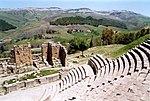 |
قریۂ جمیلہ | صوبہ سطیف ، |
Cultural: (iii)(iv) |
31 | 77 | 1982 | Situated 900 m above sea-level, Djémila, or Cuicul, with its forum, temples, basilicas, triumphal arches and houses, is an interesting example of Roman town planning adapted to a mountain location.[2] |
 |
قصبۃ الجزائر | صوبہ الجزائر ، |
Cultural: (ii)(v) |
50 | 120 | 1982 | The Kasbah is a unique kind of medina, or Islamic city. It stands in one of the finest coastal sites on the Mediterranean, overlooking the islands where a Carthaginian trading-post was established in the 4th century BC.[3] |
 |
وادیٔ مزاب | صوبہ غرادیہ ، |
Cultural: (ii)(iii)(v) |
4,000 | 9,900 | 1982 | A traditional human habitat, created in the 10th century by the Ibadites around their five ksour (fortified cities), has been preserved intact in the M’Zab valley.[4] |
 |
طاسیلی ناجر | صوبہ الیزی اور صوبہ تمنراست ، |
Mixed: (i)(iii)(vii)(viii) |
7,200,000 | 18,000,000 | 1982 | This site has one of the most important groupings of prehistoric cave art in the world. More than 15,000 drawings and engravings record the climatic changes, the animal migrations and the evolution of human life on the edge of the Sahara from 6000 BC to the first centuries of the present era.[5] |
| accessdate=17 Aug 2011}}</ref> | |||||||
| accessdate=17 Aug 2011}}</ref> | |||||||
 |
قلعۂ البحرین – Ancient Harbour and Capital of Dilmun | شمالی ولایت مصر ، |
Cultural: (ii)(iii)(iv) |
32 | 79 | 2005 | The site was the capital of the Dilmun, one of the most important ancient civilizations of the region. It contains the richest remains inventoried of this civilization, which was hitherto only known from written Sumerian references.[6] |
 |
ابو مینا | ولایت السکندریہ ، |
Cultural: (iv) |
183 | 450 | 1979 | The church, baptistry, basilicas, public buildings, streets, monasteries, houses and workshops in this early Christian holy city were built over the tomb of the martyr Menas of Alexandria, who died in A.D. 296.[7] |
 |
Ancient طیبۂ مصر اور اہراماتِ طیبہ | ولایت لکسر ، |
Cultural: (i)(iii)(vi) |
7,390 | 18,300 | 1979 | Thebes, the city of the god Amon, was the capital of Egypt during the period of the Middle and New Kingdoms.[8] |
 |
اسلامی قاہرہ | ولایت قاہرہ ، |
Cultural: (i)(v)(vi) |
524 | 1,290 | 1979 | Tucked away amid the modern urban area of Cairo lies one of the world's oldest Islamic cities, with its famous mosques, madrasas, hammams and fountains. Founded in the 10th century, it became the new centre of the Islamic world, reaching its golden age in the 14th century.[9] |
 |
منف اور اہرامات جیزہ | ولایتِ جیزہ، |
Cultural: (i)(iii)(vi) |
16,359 | 40,420 | 1979 | The capital of the Old Kingdom of Egypt has some extraordinary funerary monuments, including rock tombs, ornate mastabas, temples and pyramids. In ancient times, the site was considered one of the Seven Wonders of the World.[10] |
 |
ابو سنبل | محافظہ اسوان، |
Cultural: (i)(iii)(vi) |
374 | 920 | 1979 | This outstanding archaeological area contains such magnificent monuments as the Temples of Ramses II at Abu Simbel and the Sanctuary of Isis at Philae, which were saved from the rising waters of the Nile thanks to the International Campaign launched by UNESCO, in 1960 to 1980.[11] |
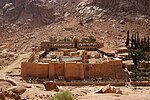 |
سینٹ کاتھرین دئر | محافظہ جنوبی سینا، |
Cultural: (i)(iii)(iv)(vi) |
60,100 | 149,000 | 2002 | The Orthodox Monastery of St Catherine stands at the foot of Mount Horeb where, the Old Testament records, Moses received the Tablets of the Law. The mountain is known and revered by Muslims as Jebel Musa. The entire area is sacred to three world religions: Christianity, Islam, and Judaism.[12] |
 |
وادیٔ الحیتان | محافظہ فیوم, |
Natural: (viii) |
20,015 | 49,460 | 2005 | Located in a desert, the site contains fossil remains of the now extinct Archaeoceti, a suborder of whales, showing the evolution of the whales from a land-based to an aquatic mammal.[13] |
| — | آشور (قلعۂ شرقت) | محافظہ صلاح الدین, |
Cultural: (iii)(iv) |
70 | 170 | 2003 | The ancient city of Ashur is located on the Tigris River in northern Mesopotamia. The city dates back to the 3rd millennium BC. From the 14th to the 9th centuries BC it was the first capital of the Assyrian Empire. The city was destroyed by the Babylonians, but revived during the Parthian period in the 1st and 2nd centuries AD.[14] |
 |
الحضر | محافظہ نینوی، |
Cultural: (ii)(iii)(iv)(vi) |
324 | 800 | 1985 | A large fortified city under the influence of the Parthian Empire and capital of the first Arab Kingdom, Hatra withstood invasions by the Romans in A.D. 116 and 198 thanks to its high, thick walls reinforced by towers.[15] |
 |
سامرا Archaeological City | محافظہ صلاح الدین، |
Cultural: (ii)(iii)(iv) |
15,058 | 37,210 | 1985 | Samarra Archaeological City is the site of a powerful Islamic capital city that ruled over the provinces of the Abbasid Empire extending from Tunisia to Central Asia for a century. The 9th-century Great Mosque and its spiral minaret are among the numerous remarkable architectural monuments of the site, 80% of which remain to be excavated.[16] |
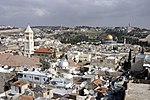 |
شہرِ قدسِ قدیمہ یروشلم | Jerusalem، |
Cultural: (ii)(iii)(vi) |
— | — | 1985 | As a holy city for Judaism, Christianity and Islam, Jerusalem has always been of great symbolic importance. It is recognized by all three religions as the site of Abraham's sacrifice. The Wailing Wall delimits the quarters of the different religious communities, while the Resurrection rotunda in the Church of the Holy Sepulchre houses Christ's tomb.[17] |
 |
پیٹرا | محافظہ معان، |
Cultural: (i)(iii)(iv) |
— | — | 1985 | Inhabited since prehistoric times, this Nabataean caravan-city, situated between the Red Sea and the Dead Sea, was an important crossroads between Arabia, Egypt and Syria-Phoenicia. Petra is half-built, half-carved into the rock, and is surrounded by mountains riddled with passages and gorges.[18] |
 |
قصر عمرا | محافظہ زرقاء، |
Cultural: (i)(iii)(iv) |
— | — | 1985 | Built in the early 8th century, this exceptionally well-preserved desert castle was both a fortress with a garrison and a residence of the Umayyad caliphs.[19] |
 |
ام الرصاص | محافظہ مادبا، |
Cultural: (i)(iv)(vi) |
24 | 59 | 2005 | Most of this archaeological site, which started as a Roman military camp and grew to become a town from the 5th century, has not been excavated. It contains remains from the Roman, Byzantine and Early Muslim periods (end of 3rd to 9th centuries AD) and a fortified Roman military camp.[20] |
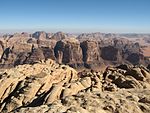 |
وادیٔ رم Protected Area | محافظہ عقبہ، |
Mixed: (iii)(v)(vii) |
74,180 | 183,300 | 2005 | The 74,000-hectare property, inscribed as a mixed natural and cultural site, is situated in southern Jordan, near the border with Saudi Arabia. It features a varied desert landscape, as well as 25,000 rock carvings with 20,000 inscriptions trace the evolution of human thought and the early development of the alphabet.[21] |
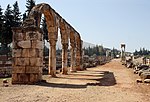 |
عنجر | بقاع محافظہ، |
Cultural: (iii)(iv) |
— | — | 1984 | The city of Anjar was founded by Caliph Walid I at the beginning of the 8th century. The ruins reveal a very regular layout, reminiscent of the palace-cities of ancient times, and are a unique testimony to city planning under the Umayyads.[22] |
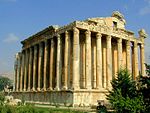 |
بعلبک | بقاع محافظہ، |
Cultural: (i)(iv) |
— | — | 1984 | Baalbek, where a triad of deities was worshipped, was known as Heliopolis during the Hellenistic period. It retained its religious function during Roman times, when the sanctuary of the Heliopolitan Jupiter attracted thousands of pilgrims.[23] |
 |
جبیل | محافظہ جبل لبنان، |
Cultural: (iii)(iv)(vi) |
— | — | 1984 | The ruins of many successive civilizations are found at Byblos, one of the oldest Phoenician cities. Inhabited since Neolithic times, it has been closely linked to the legends and history of the Mediterranean region for thousands of years.[24] |
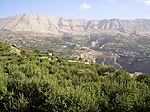 |
وادیٔ قادیشا (the Holy Valley) and the Forest of the Cedars of God (Horsh Arz el-Rab) | محافظہ شمالی، |
Cultural: (iii)(iv) |
— | — | 1998 | The Qadisha valley is one of the most important early Christian monastic settlements in the world. Nearby are the remains of the great forest of cedars of Lebanon, highly prized in antiquity for the construction of great religious buildings.[25] |
 |
صور | محافظہ جنوبی، |
Cultural: (iii)(vi) |
154 | 380 | 1984 | Tyre ruled the seas and founded prosperous colonies such as Cadiz and Carthage, but its historical role declined at the end of the Crusades. There are important archaeological remains, mainly from Roman times.[26] |
 |
شحات ، لیبیا | جبل الاخضر، |
Cultural: (ii)(iii)(vi) |
— | — | 1982 | A colony of the Greeks of Thera, Cyrene was one of the principal cities in the Hellenic world. It was Romanized and remained a great capital until the earthquake of 365. A thousand years of history is written into its ruins, which have been famous since the 18th century.[27] |
 |
لبدۂ کبریٰ | Khoms، |
Cultural: (i)(ii)(iii) |
— | — | 1982 | Leptis Magna was enlarged and embellished by Septimius Severus, who was born there and later became emperor. It was one of the most beautiful cities of the Roman Empire, with its imposing public monuments, harbour, market-place, storehouses, shops and residential districts.[28] |
 |
صبراتہ | زاویہ ضلع، |
Cultural: (iii) |
— | — | 1982 | A Phoenician trading-post that served as an outlet for the products of the African hinterland, Sabratha was part of the short-lived Numidian Kingdom of Massinissa before being Romanized and rebuilt in the 2nd and 3rd centuries A.D.[29] |
 |
Old Town of Ghadamès | نالوت ضلع، |
Cultural: (v) |
— | — | 1986 | Ghadamès, known as 'the pearl of the desert', stands in an oasis. It is one of the oldest pre-Saharan cities and an outstanding example of a traditional settlement.[30] |
 |
الجم | مہدیہ، سانچہ:Country data تونیسیا |
Cultural: (iv)(vi) |
1.37 | 3.4 | 1979 | The Amphitheatre of El Jem, built during the 3rd century, is North Africa's largest coliseum with a capacity of 35,000 spectators, and "illustrates the grandeur and extent of Imperial Rome."[31] |
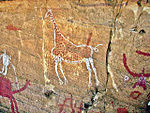 |
Rock-Art Sites of Tadrart Acacus | فزان، |
Cultural: (iii) |
— | — | 1985 | The rocky massif has thousands of cave paintings in very different styles, dating from 12,000 BCE to 100 CE.[32] |
 |
Ancient Ksour of وادان, شنقیط, تیشیت and ولاتہ | وادان, شنقیط, تیشیت, and ولاتہ، |
Cultural: (iii)(iv)(v) |
— | — | 1996 | Founded in the 11th and 12th centuries to serve the caravans crossing the Sahara, these trading and religious centres became focal points of Islamic culture. They have managed to preserve an urban fabric that evolved between the 12th and 16th centuries.[33] |
 |
Banc d'Arguin National Park | نواذیبو and Azefal, |
Natural: (ix)(x) |
1,200,000 | 3,000,000 | 1989 | The park consists of sand dunes, coastal swamps, small islands, and shallow bodies of water, all bordering the coast of the Atlantic Ocean. Birds are often found to migrate in the area, accompanied by various species of sea turtles and dolphins, whose presence fishermen often use to attract fish.[34] |
 |
Archaeological Site of Volubilis | مکناس تافیلالت, |
Cultural: (ii)(iii)(iv)(vi) |
42 | 100 | 1997 | The important Roman outpost of Volubilis was founded in the 3rd century BCE to become the capital of Mauritania. It contained many buildings, the remains of which have survived extensively to this day.[35] |
 |
Historic City of Meknes | مکناس تافیلالت، |
Cultural: (iv) |
— | — | 1996 | The former capital was founded in the 11th century and turned into an impressive city in Spanish-Moorish style during the 17th and 18th centuries.[36] |
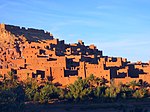 |
آیت بن حدو | سوس ماسہ درعہ, |
Cultural: (iv)(v) |
3 | 7.4 | 1987 | The ksar is a group of earthen building surrounded by high walls, a traditional pre-Saharan habitat.[37] |
 |
Medina of Essaouira (formerly Mogador) | مراکش تانسیف الحوز، |
Cultural: (ii)(iv) |
30 | 74 | 2001 | The fortified seaport built during the late 18th century has a mix of North African and European architecture, and been a major trading hub between Sahara and Europe.[38] |
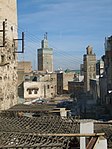 |
Medina of Fez | Fez، |
Cultural: (ii)(v) |
280 | 690 | 1981 | The former capital was founded in the 9th century and features the world's oldest university. The urban fabric and principal monuments date from the 13th and 14th centuries.[39] |
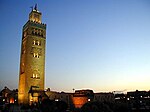 |
مراکش (شہر) | مراکش تانسیف الحوز, |
Cultural: (i)(ii)(iv)(v) |
1,107 | 2,740 | 1985 | The town was founded in the 1070s and remained a political, economic and cultural center for a long time. Monuments from that period include the مسجد کتبیہ, the قصبہ، الجزائر and the battlements. The city also has newer architectural jewels, including palaces.[40] |
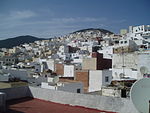 |
Medina of Tétouan (formerly known as Titawin) | طنجہ تطوان, |
Cultural: (ii)(iv)(v) |
7 | 17 | 1997 | Morocco's most complete medina served as the main point of contact between Morocco and اندلوسیا during the 8th century. After the reconquista، the town was rebuilt by Andalusian refugees.[41] |
 |
Portuguese City of Mazagan (El Jadida) | دکالہ عبدہ, |
Cultural: (ii)(iv) |
8 | 20 | 2004 | The fortification was built in Renaissance military design in the early 16th century, and taken over by Morocco in 1769. Surviving Portuguese buildings include the cistern and a گوتھک فن تعمیر church.[42] |
| — | Aflaj Irrigation Systems of Oman | Sharqiyah and الباطنہ علاقہ Regions, |
Cultural: (v) |
1,456 | 3,600 | 2006 | The property includes five aflaj irrigation systems and is representative of some 3,000 such systems still in use in Oman. The origins of this system of irrigation may date back to AD 500, but archaeological evidence suggests that irrigation systems existed in this extremely arid area as early as 2500 BC.[43] |
| — | Archaeological Sites of Bat, Al-Khutm and Al-Ayn | محافظہ الظاہرہ, |
Cultural: (iii)(iv) |
— | — | 1988 | The protohistoric site of Bat lies near a palm grove in the interior of the Sultanate of Oman. Together with the neighbouring sites, it forms the most complete collection of settlements and necropolises from the 3rd millennium B.C. in the world.[44] |
| فائل:Bahla6.jpg | Bahla Fort | محافظہ الداخلیہ، |
Cultural: (iv) |
— | — | 1987 | The oasis of Bahla owes its prosperity to the Banu Nebhan, the dominant tribe in the area from the 12th to the end of the 15th century. The ruins of the immense fort, with its walls and towers of unbaked brick and its stone foundations, is a remarkable example of this type of fortification and attests to the power of the Banu Nebhan.[45] |
| — | Land of Frankincense | محافظہ ظفار, |
Cultural: (iii)(iv) |
850 | 2,100 | 2000 | The frankincense trees of Wadi Dawkah and the remains of the caravan oasis of Shisr/Wubar and the affiliated ports of Khor Rori and Al-Baleed vividly illustrate the trade in frankincense that flourished in this region for many centuries, as one of the most important trading activities of the ancient and medieval world.[46] |
| Al-Hijr Archaeological Site (Madâin Sâlih) | صوبہ المدينہ, |
Cultural: (ii)(iii) |
1,621 | 4,010 | 2008 | Formerly known as Hegra it is the largest conserved site of the civilization of the Nabataeans south of Petra in Jordan. It features well-preserved monumental tombs with decorated facades dating from the 1st century BC to the 1st century AD.[47] | |
 |
At-Turaif District in ad-Dir'iyah | صوبہ الرياض، |
Cultural: (ii)(iii) |
29 | 72 | 2008 | Diriyah was the first capital of the Saudi Dynasty, in the heart of the Arabian Peninsula, north-west of Riyadh. It includes the remains of many palaces and an urban ensemble built on the edge of the ad-Dir’iyah oasis.[48] |
 |
Archaeological Sites of the Island of Meroe | دریائے نیل (ریاست)، |
Cultural: (ii)(iii)(iv)(v) |
2,357 | 5,820 | 2011 | The site, a semi-desert landscape between the Nile and Atbara rivers, was the heartland of the Kingdom of Kush, a major power from the 8th century B.C. to the 4th century A.D.[49] |
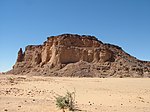 |
Gebel Barkal and the Sites of the Napatan Region | Northern State, |
Cultural: (i)(ii)(iii)(iv)(vi) |
183 | 450 | 2003 | The five sites in the دریائے نیل feature temples that are a testimony to the نبتہn (900–270 BCE) and Meroitic (270 BCE – 350 CE) cultures.[50] |
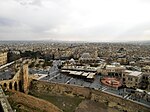 |
Ancient City of Aleppo | محافظہ حلب، |
Cultural: (iii)(iv) |
350 | 860 | 1986 | Located at the crossroads of several trade routes from the 2nd millennium B.C., Aleppo was ruled successively by the Hittites, Assyrians, Arabs, Mongols, Mamelukes and Ottomans.[51] |
 |
بصرى | محافظہ درعا، |
Cultural: (i)(iii)(vi) |
— | — | 1980 | Bosra, once the capital of the Roman province of Arabia, was an important stopover on the ancient caravan route to Mecca. A magnificent 2nd-century Roman theatre, early Christian ruins and several mosques are found within its great walls.[52] |
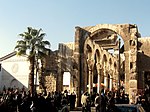 |
دمشق | محافظہ دمشق، |
Cultural: (i)(ii)(iii)(iv)(vi) |
86 | 210 | 1979 | Founded in the 3rd millennium B.C., Damascus is one of the oldest cities in the Middle East. In the Middle Ages, it was the centre of a flourishing craft industry, specializing in swords and lace.[53] |
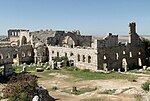 |
Ancient Villages of Northern Syria | Cultural: (iii)(iv)(v) |
12,290 | 30,400 | 2011 | Some 40 villages grouped in eight parks situated in north-western Syria provide remarkable testimony to rural life in late Antiquity and during the Byzantine period.[54] | |
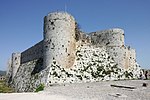 |
Crac des Chevaliers and Qal’at Salah El-Din | Homs and Latakia Governorates, |
Cultural: (ii)(iv) |
9 | 22 | 2006 | These two castles represent the most significant examples illustrating the exchange of influences and documenting the evolution of fortified architecture in the Near East during the time of the Crusades (11th - 13th centuries).[55] |
 |
تدمر | محافظہ حمص، |
Cultural: (i)(ii)(iv) |
0.36 | 0.89 | 1980 | An oasis in the Syrian desert, north-east of Damascus, Palmyra contains the monumental ruins of a great city that was one of the most important cultural centres of the ancient world.[56] |
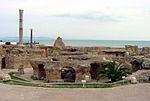 |
قرطاجنہ | تونس (ولایت), سانچہ:Country data تونیسیا |
Cultural: (ii)(iii)(vi) |
— | — | 1979 | Founded in the 9th century BCE, Carthage was developed into a trading empire spanning the بحیرہ روم, and was, according to UNESCO, "home to a brilliant civilization." The city was destroyed in 146 BCE in the Punic Wars at the hands of the Romans, but was later rebuilt by these.[57] |
 |
Dougga / Thugga | باجا, سانچہ:Country data تونیسیا |
Cultural: (ii)(iii) |
70 | 170 | 1997 | The site features the ruins of Dougga, a former capital of a Libyan –Punic state, which flourished under قدیم روم and the Byzantine Empire، but declined in the Islamic period.[58] |
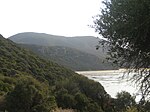 |
Ichkeul National Park | بنزرت, سانچہ:Country data تونیسیا |
Natural: (x) |
12,600 | 31,000 | 1980 | Ichkeul Lake and the surrounding wetlands is a major stopover for hundreds of thousands of migrating bird, including ducks, ہنس, storks and pink flamingos. Ichkeul is the last remaining lake in a chain that once extended across North Africa.[59] |
 |
قیروان | قیروان, سانچہ:Country data تونیسیا |
Cultural: (i)(ii)(iii)(v)(vi) |
68 | 170 | 1988 | The city was founded in 670 and flourished as a capital in the 9th century. Its heritage includes the جامع القیروان الاکبر and the Mosque of the Three Gates.[60] |
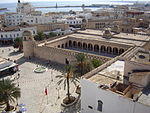 |
سوسہ | سوسہ، سانچہ:Country data تونیسیا |
Cultural: (iii)(iv)(v) |
32 | 79 | 1988 | The city was an important commercial and military port during the 9th century and a typical example of a town dating from the first centuries of Islam.[61] |
 |
تونس شہر | تونس (ولایت), سانچہ:Country data تونیسیا |
Cultural: (ii)(iii)(v) |
296 | 730 | 1979 | The medina contains 700 monuments, including palaces, mosques, mausoleums, مدرسہ and fourtains, testifying to Tunis golden age from the 12th to the 16th century.[62] |
 |
Punic Town of Kerkuane and its Necropolis | نابل, سانچہ:Country data تونیسیا |
Cultural: (iii) |
— | — | 1985 | The city was abandoned in 250 BCE during the First Punic War, and remains the only example of a Phoenicio–Punic settlement.[63] |
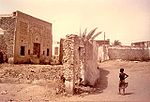 |
Historic Town of Zabid | محافظہ الحدیدہ، |
Cultural: (iii) |
— | — | 1993 | Zabid was the capital of Yemen from the 13th to the 15th century. The city played an important role in the Arab and Muslim world for many centuries because of its Islamic university.[64] |
 |
Old City of Sana'a | Sana Governorate، |
Cultural: (iv)(v)(vi) |
— | — | 1986 | Sana’a has been inhabited for more than 2,500 years. In the 7th and 8th centuries the city became a major centre for the propagation of Islam. This religious and political heritage can be seen in the 103 mosques, 14 hammams and over 6,000 houses, all built before the 11th century.[65] |
 |
Old Walled City of Shibam | محافظہ حضرموت، |
Cultural: (iii)(iv)(v) |
— | — | 1982 | The 16th-century city of Shibam is one of the oldest and best examples of urban planning based on the principle of vertical construction.[66] |
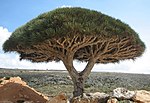 |
Socotra Archipelago | محافظہ حضرموت، |
Natural: (x) |
410,460 | 1,014,300 | 2008 | Socotra Archipelago, in the northwest Indian Ocean near the Gulf of Aden, is 250 km long and comprises four islands and two rocky islets which appear as a prolongation of the Horn of Africa. The site is of universal importance because of its biodiversity with rich and distinct flora and fauna.[67] |
حوالہ جات
ترمیم- ↑ "Al Qal'a of Beni Hammad"۔ UNESCO۔ 25 دسمبر 2018 میں اصل سے آرکائیو شدہ۔ اخذ شدہ بتاریخ 17 اگست 2011
- ↑ "Djémila"۔ UNESCO۔ 25 دسمبر 2018 میں اصل سے آرکائیو شدہ۔ اخذ شدہ بتاریخ 17 اگست 2011
- ↑ "Kasbah of Algiers"۔ UNESCO۔ 25 دسمبر 2018 میں اصل سے آرکائیو شدہ۔ اخذ شدہ بتاریخ 17 اگست 2011
- ↑ "M'zab Valley"۔ UNESCO۔ 25 دسمبر 2018 میں اصل سے آرکائیو شدہ۔ اخذ شدہ بتاریخ 17 اگست 2011
- ↑ "Tassili n'Ajjer"۔ UNESCO۔ 25 دسمبر 2018 میں اصل سے آرکائیو شدہ۔ اخذ شدہ بتاریخ 17 اگست 2011
- ↑ "Qal'at al-Bahrain – Ancient Harbour and Capital of Dilmun"۔ UNESCO۔ 25 دسمبر 2018 میں اصل سے آرکائیو شدہ۔ اخذ شدہ بتاریخ 17 اگست 2011
- ↑ "Abu Mena"۔ UNESCO۔ 25 دسمبر 2018 میں اصل سے آرکائیو شدہ۔ اخذ شدہ بتاریخ 17 اگست 2011
- ↑ "Ancient Thebes with its Necropolis"۔ UNESCO۔ 25 دسمبر 2018 میں اصل سے آرکائیو شدہ۔ اخذ شدہ بتاریخ 17 اگست 2011
- ↑ "Historic Cairo"۔ UNESCO۔ 25 دسمبر 2018 میں اصل سے آرکائیو شدہ۔ اخذ شدہ بتاریخ 17 اگست 2011
- ↑ "Memphis and its Necropolis – the Pyramid Fields from Giza to Dahshur"۔ UNESCO۔ 25 دسمبر 2018 میں اصل سے آرکائیو شدہ۔ اخذ شدہ بتاریخ 17 اگست 2011
- ↑ "Nubian Monuments from Abu Simbel to Philae"۔ UNESCO۔ 25 دسمبر 2018 میں اصل سے آرکائیو شدہ۔ اخذ شدہ بتاریخ 17 اگست 2011
- ↑ "Saint Catherine Area"۔ UNESCO۔ 25 دسمبر 2018 میں اصل سے آرکائیو شدہ۔ اخذ شدہ بتاریخ 17 اگست 2011
- ↑ "Wadi Al-Hitan (Whale Valley)"۔ UNESCO۔ 25 دسمبر 2018 میں اصل سے آرکائیو شدہ۔ اخذ شدہ بتاریخ 17 اگست 2011
- ↑ "Ashur (Qal'at Sherqat)"۔ UNESCO۔ 25 دسمبر 2018 میں اصل سے آرکائیو شدہ۔ اخذ شدہ بتاریخ 17 اگست 2011
- ↑ "Hatra"۔ UNESCO۔ 25 دسمبر 2018 میں اصل سے آرکائیو شدہ۔ اخذ شدہ بتاریخ 17 اگست 2011
- ↑ "Samarra Archaeological City"۔ UNESCO۔ 25 دسمبر 2018 میں اصل سے آرکائیو شدہ۔ اخذ شدہ بتاریخ 17 اگست 2011
- ↑ "Old City of Jerusalem and its Walls"۔ UNESCO۔ 25 دسمبر 2018 میں اصل سے آرکائیو شدہ۔ اخذ شدہ بتاریخ 17 اگست 2011
- ↑ "Petra"۔ UNESCO۔ 25 دسمبر 2018 میں اصل سے آرکائیو شدہ۔ اخذ شدہ بتاریخ 17 اگست 2011
- ↑ "Qasr Amra"۔ UNESCO۔ 25 دسمبر 2018 میں اصل سے آرکائیو شدہ۔ اخذ شدہ بتاریخ 17 اگست 2011
- ↑ "Um er-Rasas (Kastrom Mefa'a)"۔ UNESCO۔ 25 دسمبر 2018 میں اصل سے آرکائیو شدہ۔ اخذ شدہ بتاریخ 17 اگست 2011
- ↑ "Wadi Rum Protected Area"۔ UNESCO۔ 25 دسمبر 2018 میں اصل سے آرکائیو شدہ۔ اخذ شدہ بتاریخ 17 اگست 2011
- ↑ "Anjar"۔ UNESCO۔ 25 دسمبر 2018 میں اصل سے آرکائیو شدہ۔ اخذ شدہ بتاریخ 17 اگست 2011
- ↑ "Baalbek"۔ UNESCO۔ 25 دسمبر 2018 میں اصل سے آرکائیو شدہ۔ اخذ شدہ بتاریخ 17 اگست 2011
- ↑ "Baalbek"۔ UNESCO۔ 25 دسمبر 2018 میں اصل سے آرکائیو شدہ۔ اخذ شدہ بتاریخ 17 اگست 2011
- ↑ "Ouadi Qadisha (the Holy Valley) and the Forest of the Cedars of God (Horsh Arz el-Rab)"۔ UNESCO۔ 25 دسمبر 2018 میں اصل سے آرکائیو شدہ۔ اخذ شدہ بتاریخ 17 اگست 2011
- ↑ "Tyre"۔ UNESCO۔ 25 دسمبر 2018 میں اصل سے آرکائیو شدہ۔ اخذ شدہ بتاریخ 17 اگست 2011
- ↑ "Archaeological Site of Cyrene"۔ UNESCO۔ 25 دسمبر 2018 میں اصل سے آرکائیو شدہ۔ اخذ شدہ بتاریخ 17 اگست 2011
- ↑ "Archaeological Site of Leptis Magna"۔ UNESCO۔ 25 دسمبر 2018 میں اصل سے آرکائیو شدہ۔ اخذ شدہ بتاریخ 17 اگست 2011
- ↑ "Archaeological Site of Sabratha"۔ UNESCO۔ 25 دسمبر 2018 میں اصل سے آرکائیو شدہ۔ اخذ شدہ بتاریخ 17 اگست 2011
- ↑ "Old Town of Ghadamès"۔ UNESCO۔ 25 دسمبر 2018 میں اصل سے آرکائیو شدہ۔ اخذ شدہ بتاریخ 17 اگست 2011
- ↑ "Amphitheatre of El Jem"۔ UNESCO۔ 25 دسمبر 2018 میں اصل سے آرکائیو شدہ۔ اخذ شدہ بتاریخ 17 اگست 2011
- ↑ "Rock-Art Sites of Tadrart Acacus"۔ UNESCO۔ 25 دسمبر 2018 میں اصل سے آرکائیو شدہ۔ اخذ شدہ بتاریخ 17 اگست 2011
- ↑ "Ancient Ksour of Ouadane, Chinguetti, Tichitt and Oualata"۔ UNESCO۔ 25 دسمبر 2018 میں اصل سے آرکائیو شدہ۔ اخذ شدہ بتاریخ 17 اگست 2011
- ↑ "Banc d'Arguin National Park"۔ UNESCO۔ 25 دسمبر 2018 میں اصل سے آرکائیو شدہ۔ اخذ شدہ بتاریخ 17 اگست 2011
- ↑ "Archaeological Site of Volubilis"۔ UNESCO۔ 25 دسمبر 2018 میں اصل سے آرکائیو شدہ۔ اخذ شدہ بتاریخ 17 اگست 2011
- ↑ "Historic City of Meknes"۔ UNESCO۔ 25 دسمبر 2018 میں اصل سے آرکائیو شدہ۔ اخذ شدہ بتاریخ 17 اگست 2011
- ↑ "Ksar of Ait-Ben-Haddou"۔ UNESCO۔ 25 دسمبر 2018 میں اصل سے آرکائیو شدہ۔ اخذ شدہ بتاریخ 17 اگست 2011
- ↑ "Medina of Essaouira (formerly Mogador)"۔ UNESCO۔ 25 دسمبر 2018 میں اصل سے آرکائیو شدہ۔ اخذ شدہ بتاریخ 17 اگست 2011
- ↑ "Medina of Fez"۔ UNESCO۔ 25 دسمبر 2018 میں اصل سے آرکائیو شدہ۔ اخذ شدہ بتاریخ 17 اگست 2011
- ↑ "Medina of Marrakesh"۔ UNESCO۔ 25 دسمبر 2018 میں اصل سے آرکائیو شدہ۔ اخذ شدہ بتاریخ 17 اگست 2011
- ↑ "Medina of Tétouan (formerly known as Titawin)"۔ UNESCO۔ 25 دسمبر 2018 میں اصل سے آرکائیو شدہ۔ اخذ شدہ بتاریخ 17 اگست 2011
- ↑ "Portuguese City of Mazagan (El Jadida)"۔ UNESCO۔ 25 دسمبر 2018 میں اصل سے آرکائیو شدہ۔ اخذ شدہ بتاریخ 17 اگست 2011
- ↑ "Aflaj Irrigation Systems of Oman"۔ UNESCO۔ 25 دسمبر 2018 میں اصل سے آرکائیو شدہ۔ اخذ شدہ بتاریخ 17 اگست 2011
- ↑ "Archaeological Sites of Bat, Al-Khutm and Al-Ayn"۔ UNESCO۔ 25 دسمبر 2018 میں اصل سے آرکائیو شدہ۔ اخذ شدہ بتاریخ 17 اگست 2011
- ↑ "Bahla Fort"۔ UNESCO۔ 25 دسمبر 2018 میں اصل سے آرکائیو شدہ۔ اخذ شدہ بتاریخ 17 اگست 2011
- ↑ "Land of Frankincense"۔ UNESCO۔ 25 دسمبر 2018 میں اصل سے آرکائیو شدہ۔ اخذ شدہ بتاریخ 17 اگست 2011
- ↑ "Portuguese City of Mazagan (El Jadida)"۔ UNESCO۔ 25 دسمبر 2018 میں اصل سے آرکائیو شدہ۔ اخذ شدہ بتاریخ 17 اگست 2011
- ↑ "Portuguese City of Mazagan (El Jadida)"۔ UNESCO۔ 25 دسمبر 2018 میں اصل سے آرکائیو شدہ۔ اخذ شدہ بتاریخ 17 اگست 2011
- ↑ "Archaeological Sites of the Island of Meroe"۔ UNESCO۔ 25 دسمبر 2018 میں اصل سے آرکائیو شدہ۔ اخذ شدہ بتاریخ 17 اگست 2011
- ↑ "Gebel Barkal and the Sites of the Napatan Region"۔ UNESCO۔ 25 دسمبر 2018 میں اصل سے آرکائیو شدہ۔ اخذ شدہ بتاریخ 17 اگست 2011
- ↑ "Ancient City of Aleppo"۔ UNESCO۔ 25 دسمبر 2018 میں اصل سے آرکائیو شدہ۔ اخذ شدہ بتاریخ 17 اگست 2011
- ↑ "Ancient City of Bosra"۔ UNESCO۔ 25 دسمبر 2018 میں اصل سے آرکائیو شدہ۔ اخذ شدہ بتاریخ 17 اگست 2011
- ↑ "Ancient City of Damascus"۔ UNESCO۔ 25 دسمبر 2018 میں اصل سے آرکائیو شدہ۔ اخذ شدہ بتاریخ 17 اگست 2011
- ↑ "Ancient Villages of Northern Syria"۔ UNESCO۔ 25 دسمبر 2018 میں اصل سے آرکائیو شدہ۔ اخذ شدہ بتاریخ 17 اگست 2011
- ↑ "Crac des Chevaliers and Qal'at Salah El-Din"۔ UNESCO۔ 25 دسمبر 2018 میں اصل سے آرکائیو شدہ۔ اخذ شدہ بتاریخ 17 اگست 2011
- ↑ "Site of Palmyra"۔ UNESCO۔ 25 دسمبر 2018 میں اصل سے آرکائیو شدہ۔ اخذ شدہ بتاریخ 17 اگست 2011
- ↑ "Archaeological Site of Carthage"۔ UNESCO۔ 25 دسمبر 2018 میں اصل سے آرکائیو شدہ۔ اخذ شدہ بتاریخ 17 اگست 2011
- ↑ "Dougga / Thugga"۔ UNESCO۔ 25 دسمبر 2018 میں اصل سے آرکائیو شدہ۔ اخذ شدہ بتاریخ 17 اگست 2011
- ↑ "Ichkeul National Park"۔ UNESCO۔ 25 دسمبر 2018 میں اصل سے آرکائیو شدہ۔ اخذ شدہ بتاریخ 17 اگست 2011
- ↑ "Kairouan"۔ UNESCO۔ 25 دسمبر 2018 میں اصل سے آرکائیو شدہ۔ اخذ شدہ بتاریخ 17 اگست 2011
- ↑ "Medina of Sousse"۔ UNESCO۔ 25 دسمبر 2018 میں اصل سے آرکائیو شدہ۔ اخذ شدہ بتاریخ 17 اگست 2011
- ↑ "Medina of Tunis"۔ UNESCO۔ 25 دسمبر 2018 میں اصل سے آرکائیو شدہ۔ اخذ شدہ بتاریخ 17 اگست 2011
- ↑ "Punic Town of Kerkuane and its Necropolis"۔ UNESCO۔ 25 دسمبر 2018 میں اصل سے آرکائیو شدہ۔ اخذ شدہ بتاریخ 17 اگست 2011
- ↑ "Historic Town of Zabid"۔ UNESCO۔ 25 دسمبر 2018 میں اصل سے آرکائیو شدہ۔ اخذ شدہ بتاریخ 17 اگست 2011
- ↑ "Old City of Sana'a"۔ UNESCO۔ 25 دسمبر 2018 میں اصل سے آرکائیو شدہ۔ اخذ شدہ بتاریخ 17 اگست 2011
- ↑ "Old Walled City of Shibam"۔ UNESCO۔ 25 دسمبر 2018 میں اصل سے آرکائیو شدہ۔ اخذ شدہ بتاریخ 17 اگست 2011
- ↑ "Socotra Archipelago"۔ UNESCO۔ 25 دسمبر 2018 میں اصل سے آرکائیو شدہ۔ اخذ شدہ بتاریخ 17 اگست 2011